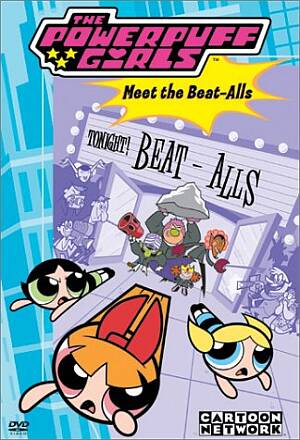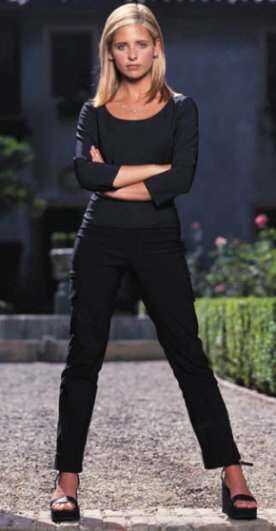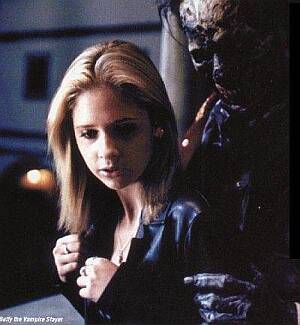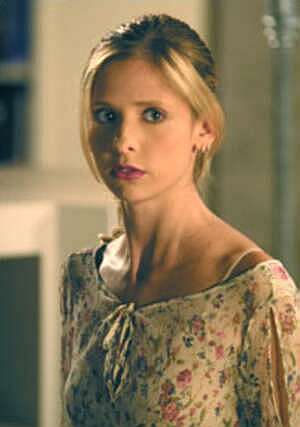★★★★½
“Pre-school superheroines kick serious tongue-in-cheek butt.”

 This sprang virtually fully-formed from the twisted mind of McCracken back in 1992, as a student film: even then, he intended it as a series, with most the characters, both heroines and villains, already present. The main change was to the title, the Cartoon Network balking at presenting a show called The Whoop-Ass Girls, and so the “can of whoop-ass” which was originally part of their make-up, was replaced by Chemical X.
This sprang virtually fully-formed from the twisted mind of McCracken back in 1992, as a student film: even then, he intended it as a series, with most the characters, both heroines and villains, already present. The main change was to the title, the Cartoon Network balking at presenting a show called The Whoop-Ass Girls, and so the “can of whoop-ass” which was originally part of their make-up, was replaced by Chemical X.
The heroines number three: Blossom, Bubbles and Buttercup, attendees at Pokey Oaks Kindergarten who just happen to have amazing superpowers – flying, laser-eye beams, incredible strength, you know the sort of thing. Each episode sees them take on a monster which threatens to destroy their home city of Townsville, or a diabolical plot by the likes of Mojo Jojo, super-intelligent simian who is perhaps their most common foe. There’s never any doubt over the outcome; the PPGs will win, and (no matter what the title says) there will be large quantities of animated whoop-ass.
Yet despite this predictability in the plot, the series continues to amaze and delight, with great characters on both sides of the law, fantastic imagination, and fabulous lines like, “The Bubbles you know is dead – I’m HARDCORE now…”. Plus there’s a whole series of riffs on pop-culture – what cartoon show would do a shot-for-shot remake of a scene from The Big Lebowski…just because? It also manages to be moral without being overly preachy, and has retained its sense of the absurd throughout. If there’s a weakness, it’s the same as any episodic show: some eps work better than others, and there are certainly dull moments. But when on-form – which is more often than not – there isn’t a more enjoyable 22 minutes of television to be seen.
Creator: Craig McCracken
Star: Cathy Cavadini, Tara Strong, E.G.Daily, Roger L. Jackson





 Season Six was in trouble from the start, with the titular heroine (literally) dead and buried. Bringing Buffy back from beyond was a problem always likely to perplex, because once you start resurrecting characters, nothing is a threat any more. Although this was handled moderately well, the show really started to fall apart after the musical episode. This demonstrated one thing beyond all reasonable doubt – why the cast are actors. From then on, most of the stories seemed to have been cribbed from daytime soaps. Buffy has sex with Spike, feels bad about it, then does it again. Xander and Anya’s on-off-off-on-off wedding and relationship. Willow and Tara were no more solidly committed, and the clumsy “magic=drugs” story arc was the sort of thing I’d expect to see on Charmed. In addition, the main bad guys for 90% of the series were a trio of geeks, minor bit players from previous episodes, who were about as threatening as flies, albeit rather more annoying.
Season Six was in trouble from the start, with the titular heroine (literally) dead and buried. Bringing Buffy back from beyond was a problem always likely to perplex, because once you start resurrecting characters, nothing is a threat any more. Although this was handled moderately well, the show really started to fall apart after the musical episode. This demonstrated one thing beyond all reasonable doubt – why the cast are actors. From then on, most of the stories seemed to have been cribbed from daytime soaps. Buffy has sex with Spike, feels bad about it, then does it again. Xander and Anya’s on-off-off-on-off wedding and relationship. Willow and Tara were no more solidly committed, and the clumsy “magic=drugs” story arc was the sort of thing I’d expect to see on Charmed. In addition, the main bad guys for 90% of the series were a trio of geeks, minor bit players from previous episodes, who were about as threatening as flies, albeit rather more annoying. Women-in-prison is not a genre greatly within our remit, since they’re often just an excuse for a bit of soft-core masochism. There are occasional exceptions, however, and this is one, with its origins as a network TV show forcing restraint of the more exploitative aspects, as well as permitting the characters to develop more fully than in a movie.
Women-in-prison is not a genre greatly within our remit, since they’re often just an excuse for a bit of soft-core masochism. There are occasional exceptions, however, and this is one, with its origins as a network TV show forcing restraint of the more exploitative aspects, as well as permitting the characters to develop more fully than in a movie. While there have been stand-out Buffy episodes since, season two perhaps ranks as the most consistently high in quality. There’s hardly an episode that ranks as less than excellent, and the writing is sparklingly witty, with more eminently quotable lines than you can shake a stake at.
While there have been stand-out Buffy episodes since, season two perhaps ranks as the most consistently high in quality. There’s hardly an episode that ranks as less than excellent, and the writing is sparklingly witty, with more eminently quotable lines than you can shake a stake at. Hannigan and Brendon claim to have learned about the show’s demise in Entertainment Weekly, but it was apparent early on that Gellar in particular was going through the motions. Whedon too, seemed to have lost interest, and you know a show is in trouble when they drag back characters from previous series, who seem ten times more interesting than the regulars. The thrust this season was towards a confrontation with the ultimate evil. Oh, my: an apocalypse – how original. And look! It’s a vampire with a soul! Pushing Buffy back into the school environment was another admission that the show had lost its way when it “graduated”, abandoning the whole concept which had powered it early on. It never found a replacement, floundering around in search of a point.
Hannigan and Brendon claim to have learned about the show’s demise in Entertainment Weekly, but it was apparent early on that Gellar in particular was going through the motions. Whedon too, seemed to have lost interest, and you know a show is in trouble when they drag back characters from previous series, who seem ten times more interesting than the regulars. The thrust this season was towards a confrontation with the ultimate evil. Oh, my: an apocalypse – how original. And look! It’s a vampire with a soul! Pushing Buffy back into the school environment was another admission that the show had lost its way when it “graduated”, abandoning the whole concept which had powered it early on. It never found a replacement, floundering around in search of a point.